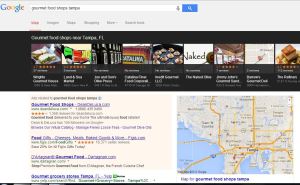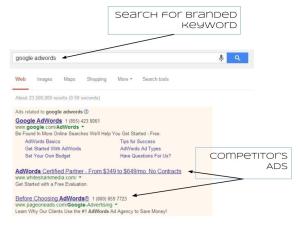Whenever I need a service or a product, the first thing I do is an online search. And I’m not alone – according to Google, 97% of consumers now search for businesses online. Most people searching for a service or product in their local area are ready to buy, which means local search is one of the best opportunities for business owners to capture highly qualified leads. Here’s how to optimize your website for that valuable local traffic:
Set Up a Google Places/Google+ Page
Since most people use Google as their primary search engine, it’s a good idea to begin your local SEO efforts by optimizing your Google Places/Google+ profile. Better yet, setting up a Google Places account is free! It’s also quite simple to set up a profile. Just follow Google’s quality guidelines and you’ll be good to go. Here are some tips:
- Only business owners or authorized representatives can verify their business listings
- Use a shared business email account, preferably under your business domain (this is especially helpful if more than one person will be making updates to your profile)
- Use your actual company name and don’t include anything extra in the name such as taglines or keywords you’re trying to rank for
- Use an accurate physical address for your business location (don’t use a P.O. box)
- Local phone numbers are best to use for your phone listing
- Choose the most accurate category for your business from the provided category list
Keep in mind, most Google Places profiles will be upgraded to a Google+ page once the listing is verified. You can also use analytics in Google+ to check on the performance of your page and make improvements in the future.
Optimize For Local Search
Provide Accurate Information
I can’t stress enough how important it is to make sure your business information is accurate and consistent across all local listings. Research compiled by HubShout, an online marketing company, showed that 43% of business listings have an incorrect or missing address. Having the correct information on every site your business is listed on will improve your credibility. More credibility and a higher level of professionalism will also make your site more favorable to search engines (and customers, too).
Have a Fully Completed Profile
It’s also important to fully complete your local business profiles. Huffington Post contributor Jonathan Long states business’s should not leave any sections of their profiles blank. Including videos, photos, contact information and detailed business descriptions will have positive effects on the long-term search performance for your website. Including keywords you want to rank for in your business descriptions is another way to fully optimize your local business profiles. On-page optimization is also extremely important when it comes to local search. To learn more tips about on-page optimization, check out my blog post on the topic.
Get Listed on Multiple Local Sites
Being included on local listing sites can also improve your local search rankings. Search Engine Land states your business should be listed on as many local listings websites as possible. Of course, it’s important to make sure the sites are high quality. Listings on spammy or thin directory sites should be avoided. It’s also a great strategy to form relationships with influential media sources, bloggers and/or customers. This will pay off in news articles, blog posts and positive reviews of your business. Online reviews can help differentiate your business from local competitors in search. See my guide to getting and keeping on-line reviews for more tips on this subject.
Be Seen in the Google Carousel
Google recently made changes to its local search. Local availability and local storefront features have been added to Product Listing Ads, making information about local stores more easily available to searchers. Read more about the changes in this article from Search Engine Watch.
One newer feature of local search is the Google Carousel. The Google Carousel is a black box including a marquee of listings that appears at the top of local search results. The listings include pictures and ratings for each local search result. Clicking on one of the pictures leads to a new search based on the business whose image was clicked. As of right now, the carousel appears mainly for searches related to travel, hospitality and restaurants. Search Engine Watch predicts Google may be expanding the carousel into more categories soon. See a screenshot of the carousel below for a search on “gourmet food shops tampa”:

The Google Carousel is yet another tool local businesses would be wise to utilize to its fullest potential. The carousel already puts your business at the top of the search, which is a great advantage. However, your business will be more visible if you follow these optimization tips (from Search Engine Watch):
- Optimize your Google+ Local Business Page
- Make sure your Google product feed is up to date through regular audits – accuracy and relevancy is key
- Include professional, high resolution business images in your profile to be used in the carousel and put them in order of priority
- Ensure business contact information is accurate and consistent across all your listings and social profiles (Google+, Yahoo Local, Bing Places, etc.)
- Have a strategy for acquiring online reviews
Implementing Local SEO Strategy
Optimizing for local search can seem like a daunting task. The company Hallam created an infographic guide to prioritizing your time and accomplishing your local SEO goals. View it here.
Just remember to perform these top five tasks (from Moz) and your business will be in good shape:
- Choose the most accurate business category for your Google Places profile.
- Use a correct, consistent company name, address and phone number across all your local business listings.
- Claim listings on important sites other than Google (Yelp, City Search, Yellow Pages, etc.) and other high quality local listing sites. Services such as Localeze and Axiom can help.
- Optimize your website by including your address and phone number on your web pages.
- Follow through on your natural link building strategy to continually acquire high quality links to your site.
Summary
Including helpful details about your business, such as photos and a description, in your local profiles and listings helps provide more value to potential customers. If the user has a seamless experience when searching for your site (i.e. they find the correct contact information on each page), they will be more likely to trust your business. Keep the user in mind and try to understand what they’re looking for when they search for your company, then optimize your profiles, listings and site accordingly for the best results.

You must be logged in to post a comment.